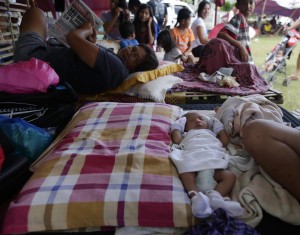Trapped Bohol villagers welcome rescuers like celebrities

Residents of Clarin town in Bohol camp out in an open space Thursday Oct. 17, 2013 to avoid aftershocks of the strong earthquake that struck Bohol and Cebu provinces Tuesday. AP PHOTO/BULLIT MARQUEZ
For three days, they ate only boiled bananas and corn, and drank coconut water while waiting for rescuers to arrive in their mountain village of Tanawan in Loon town in Bohol province.
They slept on soft ground under tattered tents that shielded them from the wind and rain.
When help finally came on Friday, the 63 villagers, 21 of them children, could not help but scream in jubilation.
“We had been waiting for them to arrive after we were told that we would be rescued. On Thursday, somebody said a chopper would come and get us, but no one arrived,” said Manilyn Mandresa, 19.
Eighteen members of the Metropolitan Manila Development Authority (MMDA) Rescue reached Tanawan about 11 a.m. on Friday, Aldo R. Mayor, their chief of public safety, said in a phone interview.
Article continues after this advertisementMayor said he had heard about some residents trapped somewhere in the mountains of Tanawan, 7 kilometers from the town proper. The roads were destroyed or blocked by boulders after last week’s devastating earthquake that hit Central Visayas.
Article continues after this advertisementMoreover, the ravines were about 200 meters deep.
“It seemed that no one was paying attention so I insisted [to rescue them] because we have to prioritize the living,” Mayor said.
With the help of a local guide, the MMDA team created a new trail leading to the villagers. They tied ropes along the way to guide them on their way back.
It took the team three hours to reach the people.
Mayor said the rescuers felt like celebrities as the residents were all happy to see them. “My hand hurt from signing autographs,” he said in jest.
It took the rescuers and the residents another three hours to get down from the mountains and the evacuation site, which is also in Tanawan.
Mandresa, a nanny, recalled that she was in Loon town proper working when the earthquake struck at 8:15 a.m. on Oct. 15. She decided to go home because she was worried about her husband, Ronaldo, and their 2-year-old son, Alexander Nigel.
She took a “habal-habal” (motorcycle for hire), but she could not get to her house because the roads were blocked by boulders. “I climbed over the rocks just to get to my son,” she said.
She found Ronaldo and her son outside their home when she arrived.
Like her neighbors, they decided to move to higher grounds for fear of being hit by falling rocks as aftershocks continued to shake the place.
Since they could not get down because the roads were impassable, they decided to stay in makeshift tents and wait for rescue. They slept on the ground, which would get wet when it rained, Mandresa said.
They ate whatever food and rice they had brought with them, she said. When the supply ran out, they just boiled corn and bananas, and drank coconut water.
Mandresa said the children started to have cough and colds from being exposed to the elements.
She said she was running out of hope when the rescuers and food packs finally arrived.